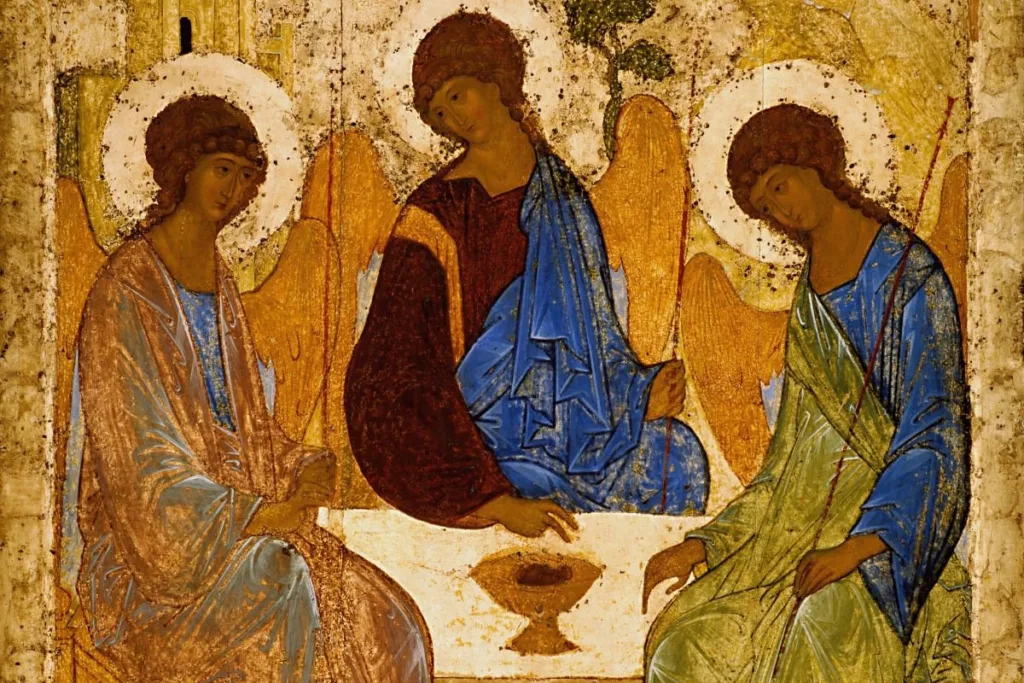Last year on Trinity Sunday, I have to admit that I was slightly disappointed. On this Sunday of the year, I have a horrible penchant for a game I call “count the heresies.” Now, before anyone says otherwise, I do not support heretical preaching. But on Trinity Sunday for years and years, I have played this game, and at times the count has been quite impressive. But last year, there was nothing. Not even a whiff of heterodoxy. So on the way out of church as we all greeted the clergy, I met the preacher and said, “Peter, you ruined my Trinity Sunday. There wasn’t even a hint of heresy in that entire sermon!” He gave me a grin, thanked me, and then gave me the look that we all know in such lines that means “move on.”
I’m sure that we all have stories of well-intentioned preachers trying to do their best to communicate the mystery of the Trinity on this Sunday of the church’s calendar. St. Augustine of Hippo didn’t say this, but it is attributed to him and I wish that he had said it: “If you deny the Trinity, you will lose your soul. But if you try to understand the Trinity, you will lose your mind.” And that is the balancing act that preachers and congregations alike must tread when faced with the astonishing self-revelation of God. Some of the most egregious attempts to tackle the mystery that I’ve heard involve the infamous water, steam, and ice analogy (a modalist heresy, in which God exists as three modes of being rather than three distinct persons), or my favorite: God is like Neapolitan ice cream! He is chocolate, strawberry, and vanilla—three flavors, all ice cream! And yes, that’s another modalist heresy. In fact, all analogies will end up in heresy, so don’t use them—particularly in those short children’s sermons we all remember. God is not “like” other things. He is actually—and especially when we’re talking about his very substance—completely other.
Trying to describe the Trinity is not an easy thing to do. Nor should we imagine that describing God would be. But in that attempt to describe the indescribable, we have been given certain parameters, tools, insights—or, to use another word, revelation—to guide us. For some, even this has proven difficult. We all know of many who have tried to adapt the names of the Persons of the Trinity, often replacing Father, Son, and Spirit, with something without gender, such as Creator, Word, and Spirit, or Creator, Redeemer, and Sustainer. This attempt, while likely attached to good intentions, is just as problematic as any other attempt to rewrite divine revelation. A general rule of thumb when describing God is, in fact, to follow his lead in this. But in this case, outlined above, there are at least three problems. One, if one Person of the Trinity is Creator, it implies that the other two Persons were created, and thus you have Unitarianism. Two, the name of Father and Son are not simply placeholders for One and Two, but rather speak to the very nature (ontology) of God, who is Father and Son eternally. It is the very nature of the Father that he is the Father of the Son, eternally. It is an eternal relationship signified by the names (i.e., being) of the Persons. Third, the attempt to assign different tasks to the different Persons of the Trinity, one creating, another redeeming, and another yet sustaining, undermines the unity of the Godhead. It is true that one Person may be a primary actor, but never without the entirety of the Godhead. God is not to be treated as three separate beings who happen to be on a committee. To say that the Spirit, for example, is not a part of the work of redemption is simply silly. Likewise, any reading of John, or many of Paul’s letters, will show that the Son was intimately involved in the creation.
The Church in her wisdom, though, knows that we need to focus on this essential doctrine, even if the mystery of it can undermine our attempts to describe it. And so on this Sunday of the year we have the only feast specifically dedicated to a doctrine. This isn’t the usual fare where we move through the life, death, resurrection, and ascension of Christ; this is a doctrine about the God who is three and yet one. It is so vitally important, however, that we need a fresh reminder of both its centrality and its truth. As Christians, we need to know that the word “God” is, in fact, shorthand for “Father, Son, and Holy Spirit.”
Continue reading at Firebrand magazine here.






Comment by David Gingrich on June 1, 2024 at 6:17 am
I don’t know, And that’s OK.
P.S. Neither do you.